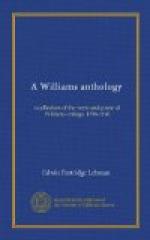“The authoress is a native of Rhode Island, but by adoption a westerner.
“Graduated from the Female College, Oxford, Ohio, when under the control of the Rev. John Walter Scott, D.D.
“Married and lived thirteen wedded years in Covington, Kentucky. Then, urged by her only brother, Levi L., a lawyer residing at M., Illinois, she removed (1870) to that city. Here she engaged in arduous and unremitting study, laboring to deserve the esteem of the gifted and cultured people with whom she had cast her lot. With the same laudable ambition that moves the man of business to be identified as successful in his life career, the writer, whose only wealth is the acquisition of knowledge and the cultivation of an inherited gift, comes before the public in a pursuit that has ever proved the animating ally of education and good breeding and the strong cordon of social refinement.”
Her first poem, Mariamne, Queen of the Jews, has a footnote which contains this interesting, if rather incomprehensible, sentence:
“The reader must take the production with its stamp of originality, which is the plainer synonym of afflatus or inspiration.”
Undoubtedly she successfully diagnosed the case.
Two passages from this remarkable poem, which is her most ambitious effort, will bear quoting:
“The swooping winds across the spicery
snare,
The aromatic smells of redolent wood,
Camphor, cinnamon, cassia, are incense
there,
And the tall aloe soaring into the flood
Of pearlaceous moonlight stimulates the
air
Which scarcely soughs, so heavy with vesper
scents;
The calamus growing by the pond, did spare
A spicey breath, with sweet sebaceous
drents
Of nard, and Jiled’s balsamic tree,
balm sweet,
Were all which filled this estival retreat.”
The other:
“The problem of Existence here when
tried,
God remains God though matter returns
to dust;
The fool can read this truth; but, if
denied,
Does spirit return to be from what it
came?
Is there reunition of love with God as
at first?
The Brahmin trusts his soul even higher,
its flame
Refines in th’ Nirvana that absorbs
its load,
Though this divine psychism seems lotus
flowed,
Seems spirit inane as that on flowers
bestowed;
Islamism prepictures the voluptuary’s
abode
Of Love unending: It is ‘Love,
love, love,’
Which souls have cried since eons began
to move.”
Now it is an infinite relief to turn from this inflated but would-be stately style to the homely diction of the Sweet Singer, as found in the Sentimental Song Book. Her book of verse is small and insignificant, and has not the prosperous, self-satisfied appearance of Mrs. L.’s volume, with its gold letters shining from a green cloth background. At the top of its paper cover the price is modestly given: 25 cents. Then is printed: “The Sweet




